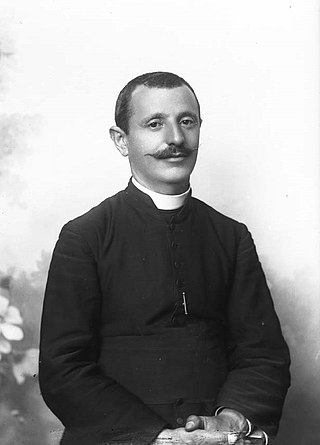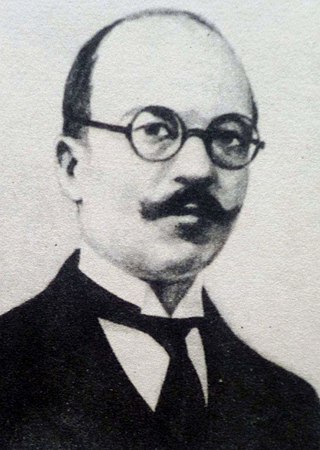
The Albanian Declaration of Independence was the declaration of independence of Albania from the Ottoman Empire. Independent Albania was proclaimed in Vlorë on 28 November 1912. Six days later the Assembly of Vlorë formed the first Government of Albania which was led by Ismail Qenali and the Council of Elders (Pleqnia).

Dhimitër Tutulani, also known as Taq Tutulani or Dhimitraq Tutulani, was an Albanian lawyer and politician from city of Berat. He was one of the signatories of the Albanian Declaration of Independence.

Babë Dud Karbunara, born Jorgji Karbunara was an Albanian teacher and politician. He was one of the signatories of the Albanian Declaration of Independence.

Ferid Vokopola was an Albanian politician, theologist, translator and delegate of Lushnjë in the Assembly of Vlora held on 28 November 1912, and one of the 40 signatories of the Albanian Declaration of Independence.
Abaz Dilaver Çelkupa or Abaz Efendi Çelkupa was an Albanian politician and one of the delegates and signatories of the Albanian Declaration of Independence in 1912. He was among the key activists of the Albanian National Awakening.

Dom Nikoll Kaçorri, was a prominent figure of the National Renaissance of Albania. A signatory of the Albanian Declaration of Independence, Dom Kaçorri served as Deputy Prime Minister of the Provisional Government of Albania, after the independence.
Xhemal Deliallisi was a prominent figure of the 19th century in the Shijak area of Albania. He was one of 40 signatories of the Albanian Declaration of Independence alongside his cousin Ymer Deliallisi. His tribe was one of the most influential in the area of central Albania where is his father, Sali bey Deliallisi, is thought to have been the founder of the modern city of Shijak.

Elmas Boçe was an Albanian educator and a signatory of the Albanian Declaration of Independence.

Syreja Vlora (1860–1940), usually referred to as Syrja Bey Vlora, was an Ottoman Albanian politician, an active figure of the Albanian Declaration of Independence in 1912 and one of the delegates of the Assembly of Vlorë.

Aristidh Ruçi was one of the signatories of Albanian Declaration of Independence in 1912. He campaigned for the spread of education in Southern Albania and was a founder of the nationalist Labëria Club.

Thanas Floqi was an Albanian educator and patriot, and one of the signatories of the Albanian Declaration of Independence.

Jani Minga was a patriot Albanian teacher and a notable follower of the National Renaissance of Albania. He was one of the signatories of Albanian Declaration of Independence.

Dhimitër Beratti or Berati was an Albanian politician, journalist, one of the signatories of the Albanian Declaration of Independence and the secretary of the Albanian delegation at the Paris Peace Conference, 1919.

Mihal Grameno was an Albanian nationalist, politician, writer, freedom fighter, and journalist. He was one of the four initial appointed delegates from Korçë to the Albanian National Congress that proclaimed the Independence of Albania on 28 November 1912.

The All-Albanian Congress was a held in Vlorë on November 28, 1912. Congress participants constituted the Assembly of Vlorë which established Albanian Provisional Government and elected Ismail Kemal as its president.
The Independence Cup is an annual friendly football tournament held in Albania on 28 November to commemorate Albanian Independence Day. The tournament took place in Vlorë between 2009 and 2015, in Tiranë in 2016 and in Korçë in 2017. Clubs from Albania, Kosovo, North Macedonia and Montenegro have taken part in the tournament. Since the 2019 Albania earthquake the tournament has not been held anymore.

Marigo Posio was one of the most distinguished Albanian women, an activist of the Albanian National Awakening and Independence Movement, and consolidating the social status of Albanian women. She is mostly remembered for sewing the flag raised by Ismail Qemali during the Albanian Declaration of Independence in Vlorë on 28 November 1912.
The Second Congress of Manastir was an Albanian congress held on 2–3 April 1910 in Manastir, back then Ottoman Empire, today's Bitola in the Republic of North Macedonia. It dealt with the challenges that the Albanian language and schools faced at the time within the context of the empire, and the platform to overcome them.













